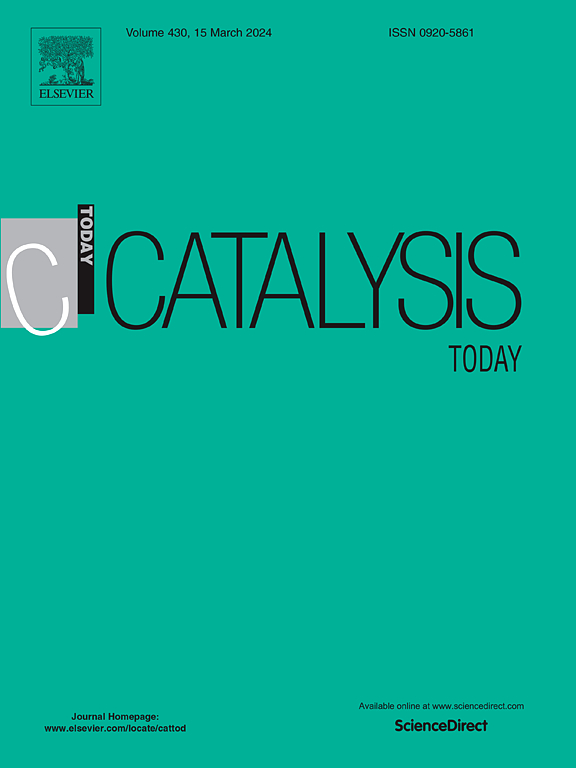Double metal cyanide complex as a heterogeneous catalyst for depolymerization of polyesters
IF 5.2
2区 化学
Q1 CHEMISTRY, APPLIED
引用次数: 0
Abstract
Plastic wastes have caused a series of environmental issues, and it has become imperative to promote the recycling of them. As an effective means to solve environmental problems and resource utilization, the chemical depolymerization of polyester via transesterification reaction was practical. Therefore, finding industrially viable transesterification catalysts is an effective strategy for establishing a recycling route for polyester plastics. Herein, we report double metal cyanide complex (DMC) directly catalyze polyester depolymerization to recover the corresponding monomers or chemicals. Poly(ethylene terephthalate) (PET) was used as representative polyester to investigate the influences of experimental conditions including the loading of the catalyst and the molar ratio of ethylene glycol (EG) to PET on the depolymerization of polyester and the selectivity of monomeric products. The kinetics of the glycolysis has been measured. PET could be completely depolymerized at 190 °C by 2 h with the molar ratio of EG/PET of 15 : 1 and the catalyst loading of 1 wt%. DMC also showed high catalytic activity on the depolymerizations of other commercial plastics of ester main-chains. DMC, a solid catalyst enjoyed inexpensive, robust, and water tolerant features in industrial process, showed prominent activity and selectivity in polyester depolymerizations and suggested scale commercial application scenario.
双金属氰化物络合物在聚酯解聚中的异相催化作用
塑料垃圾造成了一系列的环境问题,促进塑料垃圾的回收利用已势在必行。通过酯交换反应对聚酯进行化学解聚是解决环境问题和资源利用的有效手段。因此,寻找工业上可行的酯交换催化剂是建立聚酯塑料回收途径的有效策略。本文报道了双金属氰化物配合物(DMC)直接催化聚酯解聚,以回收相应的单体或化学品。以聚对苯二甲酸乙二醇酯(PET)为代表聚酯,考察了催化剂负载、乙二醇与PET的摩尔比等实验条件对聚酯解聚和单体产物选择性的影响。测定了糖酵解的动力学。在190℃条件下,2 h, EG/PET的摩尔比为15:1,催化剂负载为1 wt%, PET可以完全解聚。DMC对其他酯类主链商品塑料的解聚反应也有较高的催化活性。DMC是一种廉价、坚固、耐水的固体催化剂,在聚酯解聚过程中表现出突出的活性和选择性,具有大规模的商业应用前景。
本文章由计算机程序翻译,如有差异,请以英文原文为准。
求助全文
约1分钟内获得全文
求助全文
来源期刊

Catalysis Today
化学-工程:化工
CiteScore
11.50
自引率
3.80%
发文量
573
审稿时长
2.9 months
期刊介绍:
Catalysis Today focuses on the rapid publication of original invited papers devoted to currently important topics in catalysis and related subjects. The journal only publishes special issues (Proposing a Catalysis Today Special Issue), each of which is supervised by Guest Editors who recruit individual papers and oversee the peer review process. Catalysis Today offers researchers in the field of catalysis in-depth overviews of topical issues.
Both fundamental and applied aspects of catalysis are covered. Subjects such as catalysis of immobilized organometallic and biocatalytic systems are welcome. Subjects related to catalysis such as experimental techniques, adsorption, process technology, synthesis, in situ characterization, computational, theoretical modeling, imaging and others are included if there is a clear relationship to catalysis.
 求助内容:
求助内容: 应助结果提醒方式:
应助结果提醒方式:


